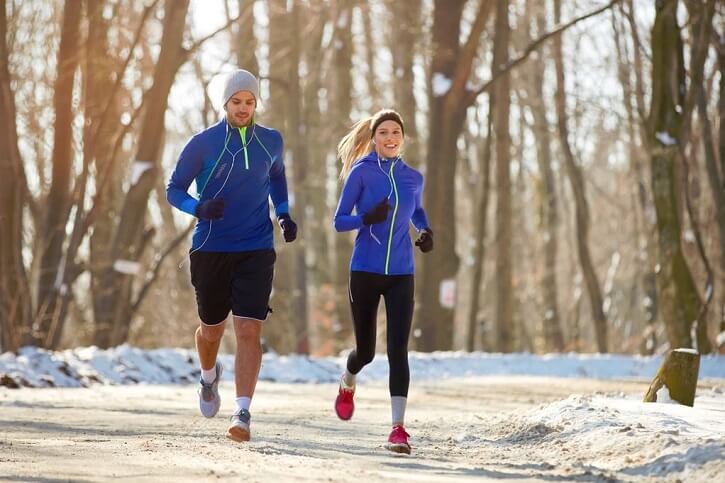Wintertime is tricky for athletes. In most of the world it’s cold, dark, wet and slushy, but above all, there are tons of bacteria flying around and looking to bring someone down. How to avoid getting sick in winter is a popular question among athletes, so in this post I’ll share some of the tips to stay healthy and get stronger for the upcoming season.
Athletes walk a tightrope on a daily basis. On one side they push themselves to improve and reach peak condition. On the other side – that extra stress from training puts more load on immune system making it operate less efficiently.
On top of that, winter is the season when the weather gets cold. Body spends more energy to stay warm and – as everyone gets sick – requires even more energy to fight bacteria and stay healthy.
Athletes usually follow a training plan that dictates what kind of sessions they need to complete. While that training stress cannot be avoided, there are couple of tricks that can help ensure we don’t put our bodies through more than they’ve signed up for.
#1 Wear Appropriate Clothing
The first rule of winter training is to always dress for the occasion. Don’t over dress and don’t under dress – simple as that. Being either cold or hot during as your exercising is equally bad. It puts more stress on the body and drains the energy from immune system.
Also, even if you’re not used to it, you should wear a hat during winter. The head is the most sensitive and vulnerable part of the body and not covering it can easily lead to a runny nose or even a flu.
#2 Don’t Keep Wet Clothes on for Long
After your training session, try to change into dry and warm clothes as soon as possible. As the body cools down after working out, wet sweaty clothes will quickly become cold driving body temperature down much more than it should go, narrowing blood vessels and preventing white blood cells from combating cortisol and infections effectively.
#3 Warm Up Indoors
Those first 10 minutes of the session when the body temperature hasn’t risen yet is just enough for viruses to spread. Duringn winter, it’s safer to do all preparatory exercises and warm the body up indoors. It helps to avoid that initial shock response as you step outside and minimizes the stress on the body to adjust to the cold weather.
#4 Move Hard Sessions Indoors
Hard training sessions (like interval training or time trials) tax our reserves more than anything else we do. They require a lot of energy and promote the release of cortisol, which weakens the immune system. Better do intense training indoors for example on a bike, treadmill or just doing a solid strength session in the gym.
It IS ok to do easy training outdoors. We need as much low intensity exercise as possible to promote blood circulation to effectively fight bacteria.
#5 Breathe Through the Nose
During harder efforts we tend to breathe more through our mouths than our nose. Compared to breathing through the nose, this way doesn’t let the air get heated up before going into our lungs and as a result, athletes risk breathing in too much cold air, which promotes the spread of infection.
Try to breathe through the nose as much as possible. It has a specific internal surface that helps to filter bacteria and prevent them from getting lower into the body (like throat or lungs).
The difference between athletes who don’t get sick and those who do comes down to the way they support their bodies outside training. Healthy athletes try to minimize non-training stress on the body to optimize energy. Below are also some other things and home remedies that athletes can do to avoid getting sick in winter. Or once the weather gets cold.
#6 Rinse the Nose with Salt Water
One non-standard way how to avoid getting sick in winter is to cleanse the nose with salt water. It helps to clean the nasal path from the nostrils to the throat, which has tons of benefits – from making the breathing easier to reducing the impact from infections and allergies.
The reason for this seemingly bizarre activity is simple. Our nose plays a vital role in filtering out all bacteria that we breathe in and prevents them from spreading down into our organs (where they can do more damage).
#7 Maintain Personal Hygiene
Good personal hygiene is essential to stay healthy since the less bacteria we will allow into our bodies, the lower will be the risk of becoming sick. So, shower regularly, brush your teeth, trim your nails and, most importantly, wash hands as often as possible. When not possible – use a hand sanitizer.
#8 Sleep Well
The most powerful recovery tool for athletes is sleep. It’s the only time when the body is in the state of complete rest and is able to rebuild muscle damage, ‘reboot’ nervous system, reduce stress and inflammation, as well as normalize hormonal balance.
Go to bed early, don’t overeat at night, sleep in a dark room and on clean bed sheets. These and other tips will help to significantly improve your quality of sleep and provide more energy for the body.
#9 Get Outside as Much as Possible
Even though it’s cold outside, make the effort and spend as much time outdoors. Our body needs oxygen and vitamin D to operate effectively and during winter it’s challenging to get enough of both.
Days are short (less sunlight) and since it’s cold, people prefer to spend time indoors. Try to get outside at any opportunity – go hiking on weekends, take a walk break, do a short run at lunchtime. Another option is to take a vacation somewhere warm. Even a week spent in warmer climate can help the body to stock up on vitamin D and supercharge the immune system.
#10 Slow Down
It might be a good idea to hit a pause on some activities to give the body extra time to recover. A cold or an illness is the body’s natural way of telling us that it approaches its limit. When the body operates at max capacity for a long time even one training session or a walk without a hat can be what puts it over the edge.
So, if you feel you’re getting tired – take a break. Don’t schedule too much into your agenda. Lower your pace of life for a while – at least until the body recovers and you feel better.
Winter is the time to be careful with your health and avoid overloading the body. Which is why it’s important to review if there are any areas you’re overlooking or that drain your energy. Remember, the way to stay healthy throughout this challenging season is to optimize your energy and support the body as much as possible.
This article has been excerpted from The Athlete Blog. Check out the original post for even more tips including nutritional advice.
Andrejs Birjukovs is a multisport athlete with training and interests in kayaking, marathon running and long-distance triathlons. Originally from Latvia, he represented his country on numerous occasions in World and European Championships, as well as the Universiade. Throughout his competitive athletic career Andrejs has learned the value of reinventing himself through physical exercise and lifestyle changes. Now he uses that experience to coach others how to sharpen the art of listening to the body and use it to lead an active, empowered & fulfilling life. He runs The Athlete Blog where he shares his training and coaching experience with the world. His first book The Resilient Athlete will be published later this year.






